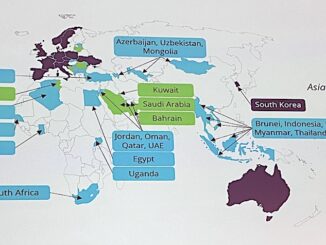The DRM Consortium has just concluded IBC Show in Amsterdamwith major announcements, while showing innovative and significant developments.A key announcement of IBC is the new introductory free membership level that allows organisations to explore the benefits and synergies created by the collaborative spirit within the DRM Consortium for their individual objectives.The many-faceted presence of the DRM Consortium members at this premier event in Amsterdam was prefaced by the virtual pre-IBC presentation focused on new receiver announcements, extra global developments and defining extra benefits of this open, all frequency bands digital radio standard and native AM/FM radio successor.The highlights of DRM’s IBC 2024 virtual and live events were, therefore, linked to its end-to end solutions: DRM is ready and being deployed around the world while making particularly great strides in Asia-Pacific, with proven and crucial benefits such as EWF – Emergency Warning Functionality.At the heart of a well-organised event hosted by Gospell on Saturday morning was the complete DRM broadcast end-to-end solution, from DRM encoders, modulators and transmitters to receivers for all platforms including car and standalone and public signage displays. The attention of the audience was particularly caught by the showcases of upgrades of several transmitters in Shanghai, Shaanxi and Henan China to DRM. To close the loop, Gospell introduced the cost-effective GR-221 DRM pocket receiver model produced in collaboration with two other key DRM members CML Micro and Cambridge Consultants. It supports DRM’s core features beyond audio services such as EWF and Journaline. The receiver updates were, in fact, a overarching focus of all DRM live events in Amsterdam.DRM’s networking event hosted by Fraunhofer IIS in the afternoon gave generous space to all Consortium members who updated the audience on their latest developments. Fraunhofer presented its own Comprehensive Solutions and Expertise along the entire DRM Digital Radio Broadcast Chain, serving the radio broadcast industry from DRM ContentServer technology to receiver decoder components and services enabling successful DRM products. The flexible and highly professional Fraunhofer IIS ContentServer technology features updated and improved audio interfaces and loudness processing along with a re-written Journaline encoder, which makes content processing for DRM core benefits such as Emergency Warning Functionality, RadioSchooling and Public Signage Services even easier.Fraunhofer was also host to updates from several DRM Consortium members.STARWAVES announced that its W2401 DRM receiver with Wi-Fi hotspot functionality is now in production. The company also showed its aftermarket car solution, and its own cost-efficient DRM receiver module with full DRM feature set for enabling local receiver production in global markets. The DRM SoftRadio App enabling DRM reception on Android phones and tablets was recently upgraded to support RTL v4 and HackRF based tuner dongles. All Starwaves products are upgradable to DAB+ reception, making them a perfect fit for multi-standard markets such as Indonesia and South Africa.Similarly, RF2Digital introduced its receiver module aimed at the automotive market supporting DRM in both AM and FM bands as well as China Digital Radio (CDR). Another innovation is the ready to demonstrate DRM and DAB+ receiver with support for DRM services in VHF band-III. These new receiver options prove the sensitivity of developers and manufacturers to the latest DRM developments in countries like China or Indonesia.DRM Consortium Member demonstrated its ability to generate DRM Multichannel broadcast signals with multiple DRM signals broadcast from a single wide-band transmitter in the VHF bands.One of the highlight announcements at the well-attended Fraunhofer IIS event was the invitation to all interested stakeholders in the broadcast industry to enjoy a one-year free Introductory DRM Membership to explore the benefits of DRM projects and collaboration.On Sunday, the event concluding DRM’s official activities at IBC 2024 took place at the Nautel booth with a recap and a brief “show and tell” of all the new announcements. The DRM end-to end solutions available today to the broadcast industry were clearly demonstrated.DRM member companies and their experts present at the DRM events during IBC 2024 included: Ampegon, BBC World Service, Cambridge Consultants, CML Micro, DAC System, Dolby, Encompass, Kintronic Labs, Radio Republik Indonesia RRI, RF2Digital, RFmondial and STARWAVES.At the end of IBC, the DRM Chairman, Ruxandra Obreja, concludes: “The theme of this year’s IBC of delivering innovation and connecting communities, was perfectly matched by the announcements and developments announced by a strong Digital Radio Mondiale Consortium in Amsterdam. Meeting all listeners’ needs, energising the market, enabling content everywhere, DRM has shown how it can offer end-to-end innovative solutions, how it fosters cooperation for comprehensive digital solutions that can unlock new opportunities with this most flexible digital audio broadcasting standard. DRM is complete, robust, and global, offering end-to-end solutions and ready to use services (such as Emergency Warning Functionality and distance learning), while saving energy costs, spectrum and ensuring full-country coverage.” […]






